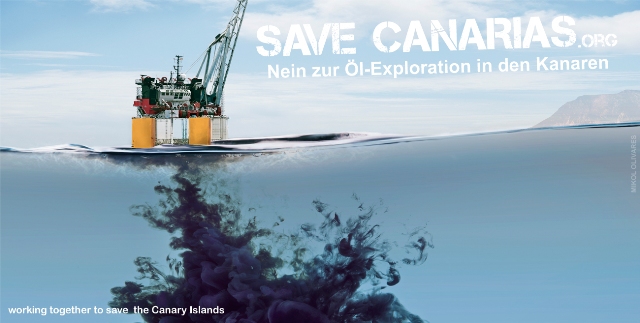Nachrichtenbeitrag
Oil exploration off the Canaries could cause irreparable damage
MADRID/ARRECIFE (NNA) – Protests are continuing on the Canaries following the decision by the Spanish government to approve oil drilling off the islands. On Lanzarote, the only petrol station there belonging to Repsol, one of the oil companies which are part of the drilling consortium, is being boycotted said Robert Schmid, president of the Fundación Antroposófica in Puerto del Carmen.
In June, some 250,000 Canaries inhabitants demonstrated against the drilling, a protest which received little attention in the international media although the archipelago is one of the most popular holiday destinations in Europe. So far more than 200,000 people have signed a petition against the oil exploration. The petition claims support from many major international environmental organisations, universities in Europe and the USA as well as scientific committees from more than 100 countries.
The Canaries are home to more than 19,000 animal and plant species over an area of 7,000 square kilometres, of which 5,000 are unique to the islands. There are four national parks and almost half the territory is protected under conventions and legislation of the UN, the EU and Spain. Oil drilling would also place the drinking water supply of the islands at risk, which is all obtained from the sea.
The Spanish authorities and the three multinational companies responsible for this project, Repsol, RWE and Woodside, had ignored these considerations, and had failed to taken into account “the criteria of the Canary Islands Government and of Lanzarote and Fuerteventura’s Council. Our most elementary democratic and ethical codes are being infringed upon,” the petition says.
Contempt for the planet
The way that the approval process for oil drilling directly off the coast of the Canaries had been handled illustrated a “purely profit-driven, irresponsible and contemptuous approach to our planet,” Schmid told NNA. The required legislative changes had been whipped through in Madrid as secretly as possible before the summer recess last year. “That actually was the end of the matter and all the subsequent campaigns by the population against the decision are – like in so many other instances – pointless. But the people who will be directly affected by the decision have no alternative, they have to defend themselves.”
For Schmidt the decision to drill for oil off the Lanzarote UNESCO biosphere reserve is symptomatic of a more general approach. A recent study by researchers at the universities of Maryland and Minnesota in the USA, partly funded by NASA, with the thrust “humanity has reached the end of the line”, showed that our civilisational model was no longer fit for purpose. According to this study, collapse could not be avoided unless there were fundamental changes. “But current thinking is controlled by ‘elites’ who are exclusively guided by and serve the profit motive,” said Schmid. This had so far successfully prevented new forms of thinking.
For some geoscientists a new age had already started, the anthropocene. “Anthroturbation”, the underground disturbance undertaken by humans, had fundamentally and permanently changed the earth: “We do not see the parallel world under our feet but it will last forever,” Schmid quotes geoscientist Mark Williams from Leicester University. Against this background the events off the coast of Lanzarote may appear to be nothing more than the proverbial “drop in the ocean”, but for the earth which was in any case “bleeding to death” it represented an additional, serious – and irreversible – wound, and for the people living in this geographical region an existential threat, Schmid emphasised.
Injury to the earth
Drilling itself will take place at the critical depth in which the oil catastrophe in the Gulf of Mexico also happened. Extravagant claims were being made about how all the risks were technically under control, but drilling represented a “profound injury to the earth’s crust”. If a disaster like the one in the Gulf of Mexico struck and the coastline and environment suffered lasting pollution from an oil spill, the island of Lanzarote “might as well shut up shop” Schmid added.
Against this background it is no surprise that the “¿Petroleo? NO” movement is supported by almost the whole population of the island. “Everyone is aware of their impotence yet new forms of protest are being thought up all the time,” Schmid said. “The total boycott of the Repsol petrol station on Lanzarote might not even represent a pinprick for Repsol , but it shows what the Lanzarotenos think of the oil drilling.”
If in the early stages of the boom times which started a good thirty years ago an awareness had developed that had only allowed solar, wind and geothermal energy on all of the Canaries, for example, oil would have been off the agenda – and that would have been true in other parts of the world as well: “So w have to change our thinking in the hope that it is never too late. And that is what the Fundación Antroposófica is working to achieve with all its strength,” its president said in conclusion.
END/nna/ung/cva
Item: 141005-05EN Date: 5 October 2014
Copyright 2014 News Network Anthroposophy Limited. All rights reserved.

